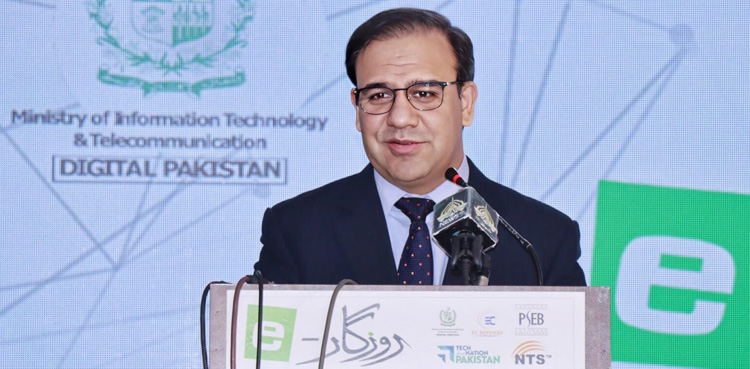
ISLAMABAD: Minister for Information Technology and Telecommunication Dr. Umar Saif has said the caretaker government had successfully achieved 13 goals, out of 15, set to promote the IT sector and increase its exports within a brief period of 5 months under the caretaker setup.
In a video message, he said, “We have achieved 13 out of 15 important targets for the promotion of the IT & telecom sector in a short period of 5 months in the caretaker set-up. The forum of SIFC will prove to be a great support for the upcoming elected government in the process of building and developing the country, and the elected government will also reap the benefits of the measures we have taken during the caretaker period.”
“We worked with the SIFC and the State Bank to make a significant policy intervention, allowing IT companies to keep 50% of their export revenue in dollars in an account in Pakistan and make their international expenses without any restrictions from this amount,” he further explained. He said that with this decision, allowing the retention of 50 percent in dollars, the country’s IT exports have increased by 32 percent in the last 60 days.
Dr. Umar Saif highlighted that the establishment of the Telecom Tribunal fulfills a longstanding demand of the telecom sector. The specialized Tribunal will now handle telecom sector disputes and cases instead of the High Courts, aiming to expedite the resolution of legal issues and facilitate rapid progress in the telecom sector.
According to the minister, the Ministry of Law will nominate the chairperson and members of the Tribunal.
The Chairperson must be a Judge of the High Court or a lawyer with 15 years of experience, he said. Similarly, the Tribunal will have 2-member technocrats, whose number may be increased or decreased from time to time.
The minister believes that this specialized approach will lead to faster and more efficient resolution of disputes, contributing to the overall advancement of the telecom industry.
He said, “The effective implementation of the Right of Way Policy, the Special Investment Council has removed all departmental hurdles, and all decisions in the interest of the country and the nation have been approved without delay.”
He said that the ministry is concurrently establishing a research and development fund to support mobile phone manufacturing companies and facilitate the growth of the mobile phone manufacturing sector.
Dr. Umar Saif said that the first standardized quality test for the 75,000 information technology graduates will be conducted soon.
He highlighted significant decisions made to revamp IT education in collaboration with various entities, including HEC, the National Computing Accreditation Council, the Examination Testing Council, the Pakistan Software Export Board, and the Pakistan Software Houses Association.
Dr. Saif said students who successfully pass the test will be offered job opportunities through the Industry Placement Program.
He added that funds will be allocated to support special industry courses in universities, aiming to prepare students for current industry trends and needs.
He explained that the National Computing Accreditation Council will consider the pass rate of students to determine a university’s rating and the permissible enrollment of IT students.
Emphasizing the importance of aligning educational institutions with industry requirements, he stressed the need for facilitating industry-specific training to bridge the gap between academic knowledge and practical industry needs.
He said that freelancers would now receive their payments through PayPal, addressing a longstanding demand. The minister clarified, “While PayPal itself is not coming to Pakistan, an agreement has been reached where remittances would be channeled through PayPal via a third party.”
“Under the newly devised program, freelancers will not need to open a PayPal account. Instead, individuals outside the country will make payments from their PayPal accounts, and the funds will be promptly deposited into the freelancers’ accounts,” the minister explained.
He said that under the nation’s first space policy approved by the federal cabinet, international companies would be allowed to provide communication services through low-orbit communication satellites.
Dr. Saif said that satellite communication technology was advancing rapidly, and many private companies in the world wanted to provide communication services through low-orbit satellites.
“Satellites used to be geostationary, far away from the land. They are useful for broadcasting TV signals but communicating is difficult because there is latency,” he said.
Dr. Saif said that the government launched a project to establish 10,000 e-Rozgar centers across the country that would be equipped with the latest facilities for freelancers and startups.
“We have also fulfilled another promise made to the people, where a significant number from the existing 1.5 million and upcoming new freelancers can work independently at very low rates,” the minister said.
He said the best facilities including high-speed internet, UPS, training centers, individual cabins, meeting rooms, and separate office rooms for start-ups had been provided to freelancers.
source https://arynews.tv/pakistan-achieves-13-out-of-15-goals-set-to-promote-it-sector-dr-saif/

0 Comments